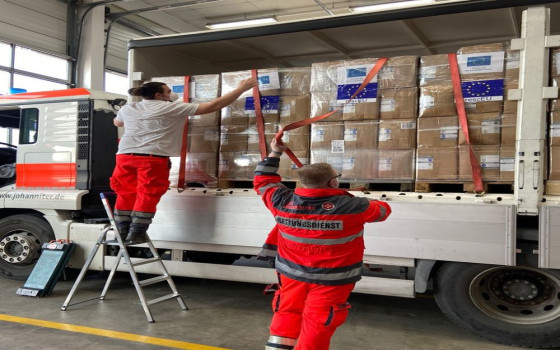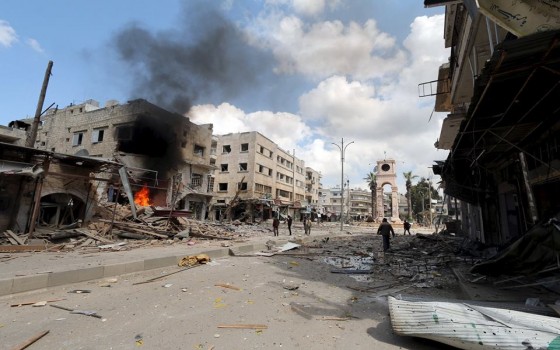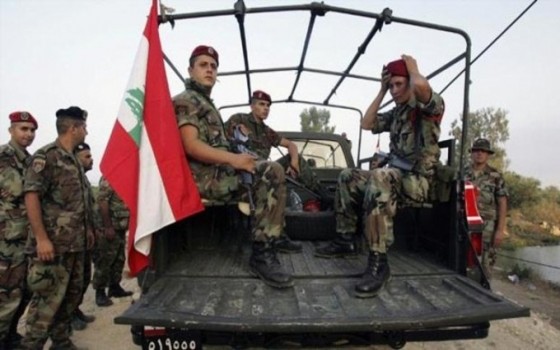
زيادة المساعدات الانسانية الاوروبية الى لبنان لتصل الى أكثر من١٠٠ مليون يورو حتى الان

- Europe and Arabs
- الخميس , 3 أكتوبر 2024 11:44 ص GMT
بروكسل : اوروبا والعرب
مع استمرار تصعيد الأعمال العدائية بين حزب الله وإسرائيل، أعلنت المفوضية الأوروبية في بروكسل اليوم الخميس عن تقديم 30 مليون يورو إضافية كمساعدات إنسانية لمساعدة المحتاجين في لبنان. ويأتي هذا بالإضافة إلى 10 ملايين يورو تم الإعلان عنها بالفعل قبل ايام قليلة وبالتحديد في 29 سبتمبر، وبذلك يصل إجمالي المساعدات الإنسانية التي قدمها الاتحاد الأوروبي إلى البلاد إلى أكثر من 104 مليون يورو هذا العام.
ومن خلال بيان وزع في بروكسل قالت رئيسة المفوضية الأوروبية، أورسولا فون دير لاين: "أنا قلقة للغاية إزاء التصعيد المستمر للتوترات في الشرق الأوسط. يجب على جميع الأطراف أن تبذل قصارى جهدها لحماية أرواح المدنيين الأبرياء. واليوم، نكثف مساعداتنا الإنسانية لشعب لبنان. وسيضمن تمويلنا الجديد حصول المدنيين على المساعدة التي يحتاجون إليها بشدة خلال هذه الأوقات الصعبة للغاية. ونواصل الدعوة إلى وقف إطلاق النار عبر الحدود مع لبنان وفي غزة، فضلاً عن إطلاق سراح جميع الرهائن".
من جانبه قال المفوض الاوروبي يانيز لينارسيتش " في هذا الوقت من الأزمة بالنسبة للبنان، تشكل السرعة والكفاءة في تقديم المساعدات أهمية بالغة لإنقاذ الأرواح. ومن خلال هذا التخصيص الطارئ، نهدف إلى دعم المتضررين من الصراع في لبنان على الفور حتى يتمكنوا من تلقي الإغاثة الفورية. ويظل الاتحاد الأوروبي ملتزماً بدعم الفئات الأكثر ضعفاً، وضمان وصول الموارد الحيوية، بما في ذلك الغذاء والمأوى والرعاية الصحية، إلى المحتاجين بشدة.
ووفقا لما جاء في البيان الاوروبي " ستوفر حزمة المساعدات الطارئة الجديدة هذه مساعدات غذائية عاجلة ومأوى ورعاية صحية من بين أشكال الدعم الأساسية الأخرى. كما تعمل المفوضية على تسهيل تسليم المساعدات المادية عبر آلية الحماية المدنية التابعة للاتحاد الأوروبي إلى بيروت.
لقد تسبب الصراع في نزوح غير مسبوق للسكان في لبنان، مع سقوط آلاف الضحايا والجرحى بين المدنيين.
كان الناس في لبنان، بما في ذلك اللاجئون، يعانون بالفعل من مستويات عالية من الفقر وانعدام الأمن الغذائي مع محدودية الوصول إلى الخدمات.
ويقدر أن ما يقرب من 2 مليون لاجئ لبناني وسوري يعانون من انعدام الأمن الغذائي. ومن المتوقع أن يرتفع هذا الرقم أكثر.
ومنذ عام 2011، خصص الاتحاد الأوروبي أكثر من 971 مليون يورو كمساعدات إنسانية للاستجابة للاحتياجات العاجلة للسكان، سواء اللبنانيين أو اللاجئين.
ومع تدهور الوضع بالنسبة للسكان اللبنانيين على نطاق أوسع، وخاصة منذ عام 2019، يتم تسليم المساعدات الإنسانية من الاتحاد الأوروبي إلى السوريين واللبنانيين الأكثر احتياجًا.
كما نظم الاتحاد الأوروبي سلسلة مؤتمرات بروكسل حول سوريا لمعالجة احتياجات اللاجئين السوريين والمجتمعات المضيفة في لبنان. ومن خلال تمويلنا الإنساني، ندعم السكان المعرضين للخطر لتلبية احتياجاتهم الأساسية من خلال الرعاية الصحية والتعليم والحماية والخدمات القانونية.












لا يوجد تعليقات